‘On the first Saturday of every month, a book is chosen as a starting point and linked to six other books to form a chain. Readers and bloggers are invited to join in by creating their own ‘chain’ leading from the selected book.‘
Six Degrees of Separation: Kate W
This month, the chain begins with Rachel Cusk’s Second Place. The narrator is M, living out in a remote country landscape with her second husband Tony, invites celebrated painter L to stay in the second cottage they own: she is powerfully attracted to his work. We’re witness to M’s inner monologues, as she worries about her relationship with her daughter, her husband and L’s antipathy towards her, manifesting itself in calculated rudeness. Cusk acknowledges the book as a re-write of Mieko Kawakami’s memoir of DH Lawrence, Lorenzo in Taos, but I haven’t read this. M could be thought obsessive, over-analytical, though much of what she thinks is beautifully expressed. Insightful? Pretentious? Only you can decide.

Some weeks on from reading Second Place, my lasting impression is of a lonely setting, and of characters who are ultimately alone. So the first link in my chain is Jane Harper’s The Lost Man. This story is set in the Australian outback, and for me the central character in the novel. Understanding the vastness, the harshness, the loneliness and unforgiving nature of this landscape was what I took from this book. It’s the story of a family, of three brothers who live next door to one another (by which you need to understand that they each live at least three hours drive from each other), and what happens after Nathan finds Cameron dead one day, by the grave of a long-dead stockman, in upsetting circumstances. The wider family unravels, then ravels again in a satisfyingly realised story, in which the ending was possibly just a little too neat. But it’s a great story, well told and visualised.
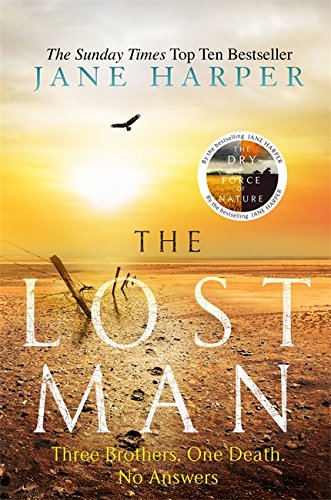
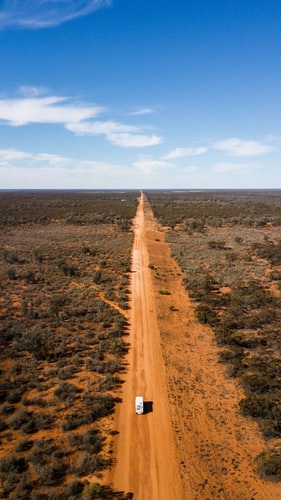
Dylan Shaw: Unsplash
Loneliness of a different kind is at the heart of Javier Marías’ Berta Isla. Berta and Tomás fall in love while still at school together. Anglo-Spanish, Tomás goes to university in Oxford, to further his extraordinary gift for languages, while Berta studies in Madrid. At Oxford, Tomás makes a mistake which obliges him to make his choice of career to work for the British secret service. It changes his and Berta’s relationship for ever. This is the story of a marriage in which the husband is largely absent to his wife, to his children and to the world at large. It takes in – at a distance – the Irish Troubles, the Falklands War, and Franco’s dictatorship.
At one point Berta herself quotes from Dickens’ Tale of Two Cities: ‘…every human creature is destined to be a profound secret and mystery to every other creature’. That’s what this book is about. A thoughtful, discursive book which will remain with me for a long time.

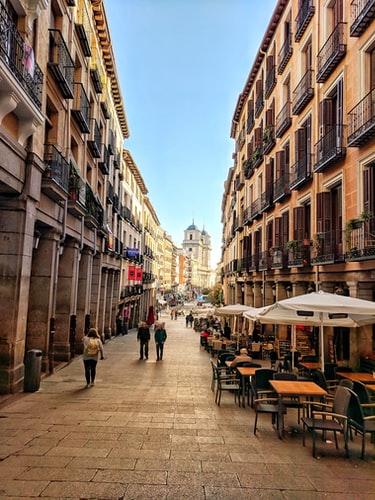
A quiet bar in Madrid (Igor Olyarnik: Unsplash)
Let’s look at loneliness of a different kind: Islands of Abandonment by Cal Flynn. This is a book about what man has done to various places on earth, and what happens when man ceases to interfere: when the mining stops; the botanical garden is left to its own devices; the fatally damaged nuclear reactor is fenced off; the WWI chemical weapons site locked and the farmland abandoned. Nature begins to take over once more. Maybe not quite in the form that it had previously, but insidiously, by adapting and making do. The wilderness revives.
This beautiful, even lyrically written book celebrates Nature’s power to recover, even when to the average aesthete the results are not conventionally pretty. It may be almost too late. There is much to be concerned, horrified and terrified about as man continues to despoil the planet. But Flyn finds hope in nature’s power to take back control. A book I am pleased to have read: and one which gave me plenty to think about, and plenty to appreciate in the quality of Flyn’s writing.
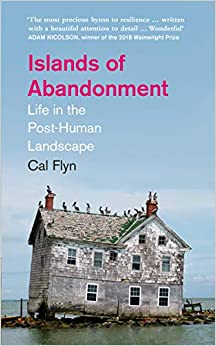

Flyn didn’t write about the desolate but strangely beautiful industrial spoilheap that is Parys Mountain in Anglesey. But she very well could have.
Back to fiction, to Cormac McCarthy’s The Road, the tale of a father and son trudging through post-Apocalypse America. This is a land where nothing grows, no small animals are there for the hunting: where communities and dwellings are deserted and long-since looted for anything that might sustain life a few more days: where other humans might prove peaceable, but might instead be evil and dangerous. This book is bleakly, sparely written. Conversations between father and son are clipped, necessary. No speech marks. Sometimes little punctuation. Every ounce of energy is needed for the business of staying alive. This book, in which nobody lives happily-ever-after will stay with me for a long time.
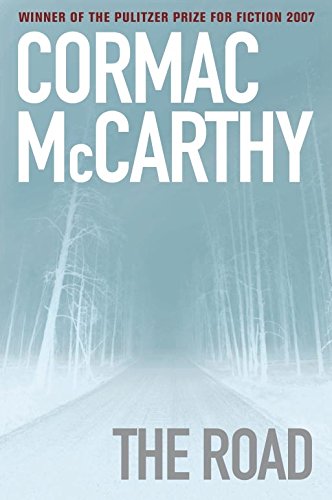
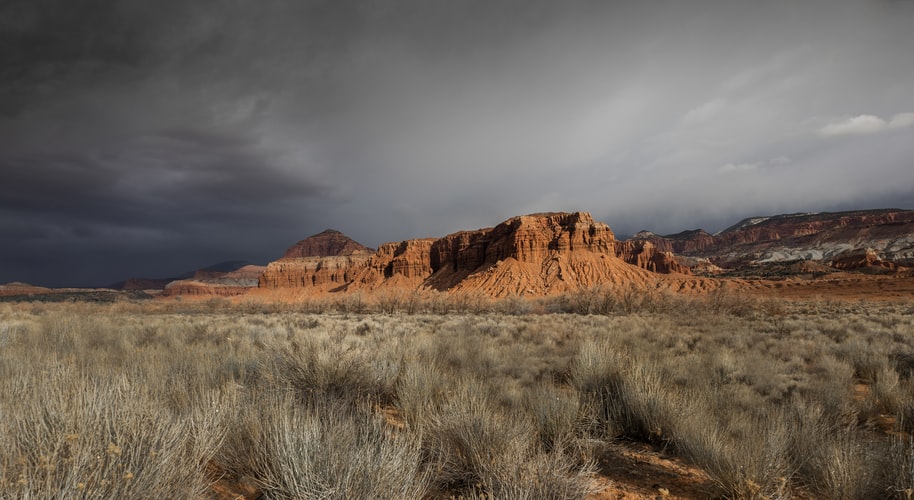
Jasper Gronewold, Unsplash
An apocalypse of a different kind is described in John Lewis-Stempel’s Six Weeks: The Short and Gallant Life of the British Officer in the First World War. I thought I was pretty clued up about the social history of World War I, but this book was a revelation. It describes the war, and life in the trenches and beyond from the point of view of the young subalterns who, in leading their men at the Front, had a life expectancy once there of six weeks. These young men, some no older than 17, had been equipped by their education in public schools to be team players, leaders, and military men through their membership of the OTC. They rose to the occasion, leading men often old enough to be their fathers, commanding their respect and even love. Some of these men became officers in their turn, because the public school men, frankly, were mainly all killed. Marlborough School, for example, lost 400 men in the Great War. This is about their short lives, and the lives of the men they led. Brilliant.
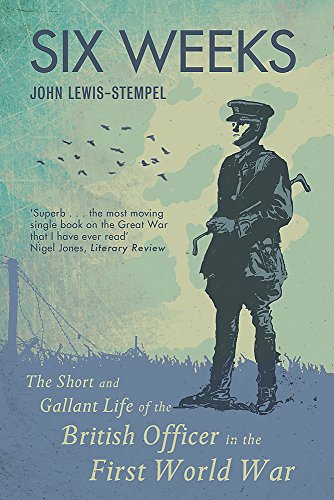

From a son et lumière at Ripon Cathedral in 2018 to commemorate the end of WWI a hundred years before
Oh goodness, this has been quite a dark month of book choices. Let’s lighten the mood for my final choice, in a book about that moment in our lives when we’re all finally alone … death. Waiting for the Last Bus by Richard Holloway. This is an excellent, thought provoking book written with a light, amusing touch. I’ve reached the stage in life where reflections on life and death seem appropriate, and this is a book I’ll read again. Holloway considers our fears of death, both for ourselves, and for those whom we love. He looks at what comes next, both for the deceased and for those left behind. A former monk, agnostic, and bishop, Holloway has written a book which is accessible to us all, not just Christians. Highly recommended, and not at all depressing.


A suitable bus to accompany this book – spotted in India. Click to view full image.

All new to me so requiring further investigation.
LikeLiked by 2 people
Always good to have books that require investigation!
LikeLike
God’s own palace! I love that, Margaret. A happy ending! I always look forward to your book choices, though I seldom get around to reading them. Berta Isla would grab me, and the resilience of nature, perhaps. Where and when do you read, and how many books a month?
LikeLiked by 2 people
The Puritan in me makes it difficult for me to read in the day (sinful, enjoying yourself), so it’s mainly at night, and in the wee small hours when I don’t sleep. Maybe 10 – 12 books a month? I remember getting a constant source of reading in English was hard when we lived in France. What do you do? I hate Kindle-style reading. It has to be a Real Book for me.
LikeLike
Ha! I’m over that. One of the pleasures of not blogging is time to read. Something rather sad by Jane Gardam-Old Filth- at present. I should be dedicating myself to Portuguese but early morning the brain’s not in gear. Only real books and whatever comes to hand. Charity shop mainly. Much slower than you. More like 4-6 books a month 🙄💕
LikeLiked by 1 person
I LOVE Old Filth!
LikeLike
🤣💕
LikeLike
Thought provoking list…
LikeLike
I hope so. Not all light, by any means.
LikeLiked by 1 person
Yes …
LikeLiked by 1 person
Great chain! During the early pandemic lockdowns, I remember news reports and social media messages about how Nature was getting some reprieve, how pollution was clearing a bit, and dolphins were returning and so forth. Islands of Abandonment reminds me of that. I’m going to look that up, thanks!
LikeLiked by 1 person
I heartily recommend it. It’s so well written, and with plenty to think about.
LikeLiked by 1 person
Wonderful set of books and nice to see The Lost Man making an appearance. Berta Isla and Islands of Abandonment sound especially tempting. I haven’t read The Road, but really liked the film adaptation. If you haven’t watched it, I can highly recommend. It had some stunning visuals and great acting.
LikeLiked by 1 person
Yes, the two you’ve singled out would be my first choices too. And I’ll look out for the Road – thanks.
LikeLiked by 1 person
Very interesting–maybe the most unique chain this month–I’m just getting started reading them 🙂 I have Six Weeks, but haven’t read it yet.
LikeLiked by 1 person
I found it shed a whole new light on a class who until the Great War struck were among the most privileged young men in the kingdom.
LikeLike
I need to get to it. The Edwardian era in UK is my favorite historical period.
LikeLiked by 1 person
A marvellous selection Margaret, and Waiting for the Last Bus seems like a must read!
LikeLiked by 1 person
Honestly, Peter, I think you’d love it. He manages this weighty topic so humorously and with such an optimistic touch.
LikeLiked by 1 person
You do find some remarkable books to read. The theme of being alone / loneliness is apt during this pandemic where many people have not coped well in that state. Jane Harper’s books are some of my favourites, probably because I am such an Australophile with a deep love for the outback and its vast emptiness. I tried to watch the film ‘The Road’ but found it too depressing. A nice link there could be to Fever by Deon Meyer, a book I can recommend.
LikeLiked by 1 person
Harper’s an excellent writer, and new to me. Thanks for the recommendation for Deon Meyer. I see we have it in our library, so I’ll look out for it.
LikeLiked by 1 person
Islands of Abandonment I have already taken note of, and Berta Isla, Six Weeks and Waiting for the Last Bus are all added to Teheran list…intriguing selection, Margaret!
LikeLiked by 1 person
That’ll keep you busy. You’ll have to investigate the Home Library Service ….
LikeLiked by 1 person
When the library gets back to running
LikeLiked by 1 person
Noooo. Is yours still shut?
LikeLiked by 1 person
Well, they re upgrading the software….
LikeLiked by 1 person
I love how you do your chain with the cover and then the extra picture with it… fascinating (if a bit dark)!
LikeLiked by 1 person
Ah well, trying to find suitable matches keeps me busy!
LikeLiked by 1 person
Margaret, what a unique twist on book posts and I love how you move from one to another! ‘The Road’ will never leave me, an incredibly intense book and you’ve captured it so well here. So many of the others you mention interest and I look forward to reading ‘Berta Isla’, it sounds incredible and love the variety of locations and will also check out ‘Waiting for the Last Bus’ – a happy book about death! Happy Reading and thank you for this terrific post!
LikeLiked by 1 person
Thanks Annika. I loved putting this chain together, but it is a bit on the dark side. Berta Isla will end up as one of my personal Books of the Year I think.
LikeLiked by 1 person
With such an endorsement I just had to go ahead and buy the Kindle book! 😀
LikeLike
Harper’s The Lost Man was very well done, but I think The Survivors, her most recent novel, is her best yet. Thanks for a fascinating chain.
LikeLiked by 1 person
And thanks for pointing me in the direction of The Survivors. I see it’s on order for our library, so I’ll keep my eyes open.
LikeLike
Great chain! I’d not heard of the John Lewis-Stempel novel. Another definite for my TBR. Thanks, Margaret.
LikeLiked by 1 person
It’s not a novel, as sadly, every word is true. But it’s a really good read.
LikeLike
6 weeks! Puts a perspective on Owens and Sassoon
LikeLiked by 1 person
Sadly, yes.
LikeLiked by 1 person
Terrific chain. I loved Berta Isla, so I was really pleased to see it here and know that someone else did too! The Last Bus book sounds interesting too.
LikeLiked by 1 person
Yes, these are to books I rated highly. Yes, it’s good to have others sharing my tastes.
LikeLike
Love the theme of loneliness – I’ll have to check out Waiting for the Last Bus (I work with people at end-of-life and always appreciate new perspectives).
LikeLiked by 1 person
I hope you enjoy this book: it got me thinking, in a positive way.
LikeLiked by 1 person
Loved seeing The Lost Man make an appearance on your list but the one that caught my attention the most was Six Weeks.
LikeLiked by 1 person
It’s some time since I read it, but this is a book that’s really stayed with me. Highly recommended.
LikeLike
I haven’t read a single one of these books, and now I want to read all of them. They sound like they will provide a lot of satisfaction. I shall bookmark, and come back to see what I can find at the library.
LikeLiked by 1 person
Mot of these came from our library service, so you may be in luck.
LikeLiked by 1 person
I always love these posts. I recognized the author John Lewis-Stempel. Six Weeks: The Short and Gallant Life of the British Officer in the First World War looks intriguing. Stempel’s book about life in the trenches showed up before my knee surgeries a few years ago and inspired me to pay more attention to the birds in my backyard. Summer’s done and now on to fall. Take care and keep walking. Peace.
LikeLiked by 1 person
I seem to remember you read that first Lewis-Stempel on my recommendation too. I feel quite honoured! I hope your term at school has begun well, and continues apace too.
LikeLike
Wow ‘The Lost Man’ and ‘The Road’ in the same collection, bleak and dry and tough times all round. Still, when you return to the here and now it doesn’t seem so bad after all does it?
LikeLiked by 1 person
There’s always someone worse off …
LikeLike
I have a completely irrational dread of The Road. Irrational because my mind associates it with On the Road, which I nearly hated. I know it’s nothing like it, and I’ve read other works by McCarthy and liked them very much. It’s just a very powerful mental block. I’ll get over it one of these days. Nice chain.
LikeLiked by 1 person
Oh, do just try the first five pages. You’ll be won over already, I feel sure! Good luck.
LikeLike
Fantastic links! And I have added Flyn’s book to my TBR!
LikeLiked by 1 person
Oh good. This is a well written book, thought provoking and telling really interesting stories. I hope you’ll enjoy it.
LikeLike
I always love these posts, but you made me laugh by lightening the mood with a book about getting ready for death.
LikeLiked by 1 person
I do realise how ridiculous this seems, but truly, I felt quite uplifted by it. Having sampled living as an atheist and as a Christain, he doesn’t impose his beliefs at all, but this positive book tells lots of helpful anecdotes in among.
LikeLiked by 1 person
I had already seen another review of it, perhaps a year ago, and thought it looked interesting.
LikeLiked by 1 person
Best read it soon. Not that you need to of course. Yet.
LikeLiked by 1 person
Wow, what a chain! Remarkably we share an author (though different books). I’d like to read all of these at the right time. Maybe I’ll start with Waiting for the Last Bus and build up to the hardcore titles. Brilliant, Margaret!
LikeLiked by 1 person
I’ve just quickly glanced at yours and am going back ASAP to read it properly. It looks interesting – and yes, we share an author. Thanks so much for getting me into 6 Degrees Sandra. I really love it, and have made other interesting connections through it.
LikeLiked by 1 person
You’ve made such a contribution, Margaret. (And I’ve watched you making connections – just as I have made them through your blog. It’s a wonderful community – and mercifully free of discord and strife!)
LikeLiked by 1 person
Exactly. We all learn such a lot from being exposed to different tastes and opinions.
LikeLiked by 1 person
A very interesting chain, Margaret though perhaps the books are a bit bleak for me at present. I can’t seem to be able to cope with any reading matter that’s too much like real life. I like the look of the last one in your chain, though. Apologies for no comments here for weeks and weeks. I have read your posts and enjoyed them all.
LikeLiked by 1 person
No apologies necessary, though I’d noticed your silence. I hope all is well? Yes, this is a bit of a bleak selection, but I hope you would enjoy the Holloway. It’s one for me, at least, to return to.
LikeLiked by 1 person
Yes, thank you, all is fine but busy.
LikeLiked by 1 person